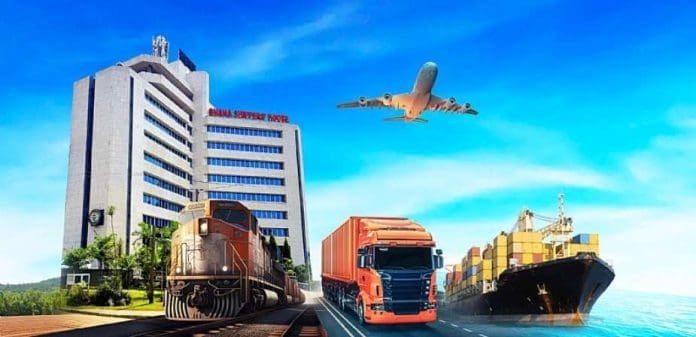
Ghanaian shippers face a stark choice: embrace global sustainability standards or watch international buyers take their business elsewhere. That was the uncompromising message delivered at a landmark workshop where maritime stakeholders confronted the reality that green credentials have become as essential as competitive pricing.
Professor Ransford Edward Gyampo, Acting Chief Executive Officer of the Ghana Shippers Authority (GSA), told participants at the maiden Blue Economy Safety and Sustainability Workshop that multinational buyers are already requiring lower-carbon logistics as part of their supply chain standards, and shippers who fail to adapt risk exclusion from greener markets.
The workshop, organized by Ocean Centres Ghana and hosted by the United Nations (UN) Global Compact Network Ghana with support from Lloyd’s Register Foundation, brought together government officials, industry players, academics, and financiers to confront an uncomfortable truth: sustainability is no longer about corporate social responsibility. It’s about market access.
“When Ghana’s ports and shipping operations are safe and sustainable, exporters gain confidence and market access, importers benefit from reliability, and small and medium enterprises (SMEs) can stay competitive despite tight margins,” Professor Gyampo explained. “Sustainability measures that improve efficiency, from digitalized customs processes to modern vessel traffic systems, also build resilience for exporters of goods such as food, horticulture, and fish.”
The stakes extend beyond environmental stewardship. In logistics, Professor Gyampo emphasized, resilience represents “the difference between profit and loss, between protection and vulnerability in foreign markets.” For Ghanaian shippers competing in increasingly sophisticated global supply chains, failing to meet sustainability benchmarks could mean watching contracts migrate to competitors in Côte d’Ivoire, Nigeria, or Togo.
Yet the GSA chief cautioned against treating sustainability purely as a cost burden. His advice to shippers carried a warning: avoid transferring the full cost of green port fees and compliance measures directly to cargo owners. Such practices risk making Ghana’s maritime services uncompetitive and diverting shipping traffic to rival regional ports that manage the transition more efficiently.
Nana Boakye Boampong, Country Lead for Ocean Centres Ghana, provided context for why these conversations matter now. The Ocean Centres initiative, established by the UN Global Compact and Lloyd’s Register Foundation, serves as a multi-stakeholder engagement platform to channel safety and sustainability in blue economy operations. Ghana’s blue economy contributes between six and seven percent of national gross domestic product (GDP), making maritime sustainability directly relevant to broader economic performance.
The technical challenges are formidable. “The industry is evolving rapidly, especially with the International Maritime Organization’s (IMO) new greenhouse gas reduction strategy,” Boampong explained. “Shipping is moving from fossil fuels to ammonia, methanol, and liquefied natural gas (LNG), each with unique safety implications. We must ensure seafarer and vessel safety while meeting environmental goals.”
Tolu Kweku Lacroix, Executive Director of the UN Global Compact Network Ghana, announced that seven additional workshops would address sector-specific sustainability challenges across the maritime industry. “The goal is to get different stakeholders to collaborate and shape strong policy recommendations that drive a more robust blue economy,” he said. “This initiative also aims to fully integrate the Sustainable Development Goals (SDGs) into Ghana’s maritime operations.”
Beth Elliot, Director of Strategic Communications at Lloyd’s Register, added a human dimension often overlooked in sustainability discussions. Ocean workers face growing risks from extreme weather patterns and need better training and mental health support as part of the green transition. Safety and sustainability, she suggested, cannot be separated.
Professor Gyampo’s most pointed remarks targeted the bureaucratic inefficiencies that undermine Ghana’s maritime competitiveness. “We must reduce the practice of inter-agency silos,” he urged. “Collaboration, sharing data, co-designing policies, and engaging in multi-stakeholder platforms is essential to achieving sustainable maritime operations.”
The call for alignment extends to regulatory frameworks. Professor Gyampo stressed that matching local regulations with international conventions, particularly those from the IMO, would help Ghana maintain its competitive edge as a trade hub. Without that alignment, foreign shippers might bypass Ghanaian ports entirely, choosing jurisdictions where compliance creates fewer complications.
The workshop’s theme, “Navigating a Safer and Greener Future: Integrating Sustainability and Safety in Port and Shipping Operations,” reflected an understanding that these aren’t separate challenges but intertwined imperatives. Safe operations reduce environmental risks; sustainable practices protect worker welfare; efficiency improvements benefit both planet and profit margins.
For Ghana’s maritime sector, the transition represents both challenge and opportunity. Countries that lead the shift toward sustainable shipping position themselves as preferred partners for multinational corporations under pressure to decarbonize their entire supply chains. Those that lag risk becoming footnotes in regional trade flows.
“The path to a safer and greener maritime future will not be simple, but it is necessary,” Professor Gyampo concluded. “The choices we make now in policy, investments, and partnerships will determine whether Ghana leads or lags in Africa’s blue economy. Efficiency, collaboration, and safety are the new currencies of competitiveness. The sooner Ghanaian shippers understand this, the sooner we can secure our place as a trusted gateway for West Africa.”
